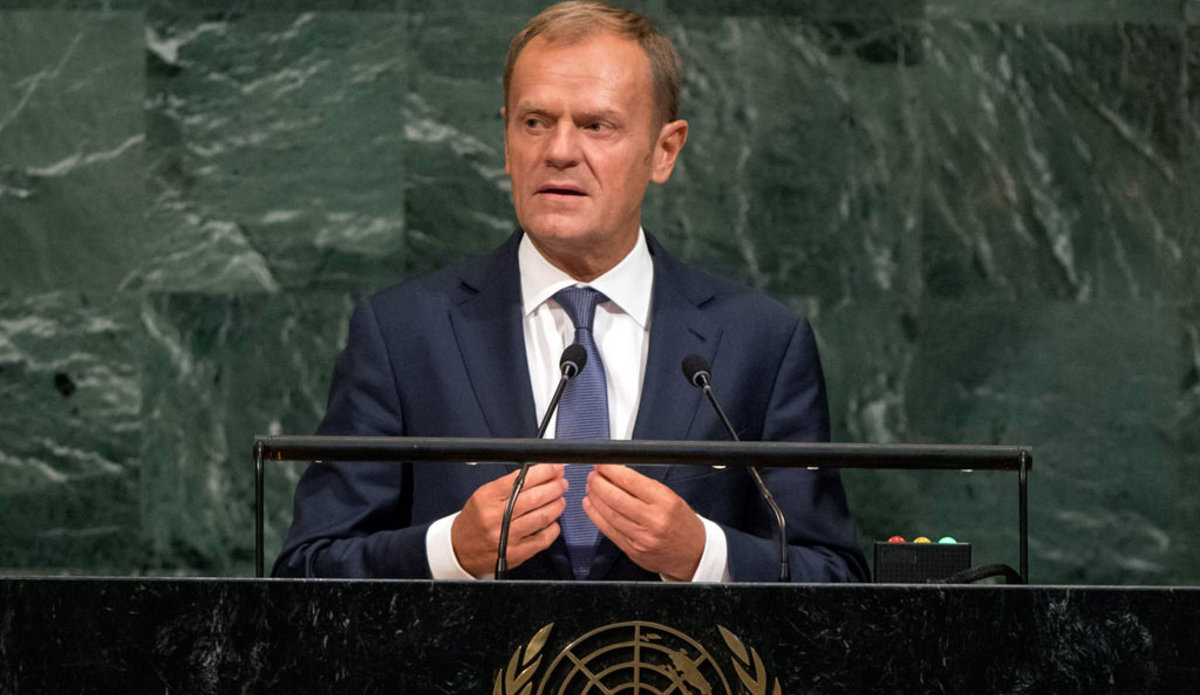Mr. Tusk said the European Union (EU) continues to receive people in need of protection. He echoed his appeal to the international community to take responsibility for refugee protection and irregular migration, underscoring the EU’s support of the UN process to develop Global Compacts on Refugees and on Regular, Safe and Orderly Migration.
“Your engagement is needed right now, both in terms of money for humanitarian assistance, and more resettlement for those displaced by conflicts in Syria, Yemen, Myanmar, and especially across Africa,” he told the Assembly.
In connection with the refugee crisis, Mr. Tusk urged a “crackdown on human smugglers that exploit vulnerable people and violate sovereign borders,” and welcomed the International Criminal Court investigation on smugglers in Libya for crimes against humanity.
Against the backdrop of repeated terrorist attacks, he stressed the need for the constant strengthening of the global fight against that scourge and violent extremism, including doing more on counter-radicalization. He reiterated his plea to the world’s Muslim leaders to stand strong against Islamist extremism as a real support in fighting terrorism. “In short,” the President said “we must be more determined than they are.”
Sauli Niinistö, President of Finland, addresses the general debate of the General Assembly’s seventy-second session. UN Photo/Cia Pak
In his address, the President of Finland called the Secretary-General’s determination to reform the UN “laudable,” spotlighting that transparency, accountability, efficiency and gender balance “should be the guiding principles of the UN system.”Sauli Niinisto also welcomed the Secretary-General’s focus on conflict prevention, advocating for the marginalized to be given a voice in peace processes. “Women, children and adolescents often pay the highest price in conflicts but they can also help to pave a way out of the crisis,” he told the Assembly, while pointing to Finland’s contribution in establishing a Nordic network of women mediators who provide inclusive and meaningful participation in all phases of peace processes.
Pledging his support for UN peacekeeping reform, he drew attention to Finland’s increased participation in UN police missions – now through seven UN operations, including a specialized team on sexual and gender based violence in South Sudan. “It is my strong view that no UN peacekeeper nor any other UN personnel should be associated with misconduct of any shape or form. In particular, there must be ‘zero tolerance’ with regard to sexual exploitation and abuse,” he stressed.
Turning to the Democratic People’s Republic of Korea, Mr. Niinisto called that country’s nuclear weapons programme “a threat to global peace and stability,” that must be stopped. While stressing the importance of the continued unity of the Security Council, he underscored: “Such behaviour cannot be tolerated by the international community.”
Before leaving the podium, Mr. Niinisto expressed his strong belief that global challenges and threats be addressed together by the world community. “Peace and security, human rights and development belong to all of us. Only together can we make this world a better place,” he concluded.
Rumen Radev, President of the Republic of Bulgaria, addresses the general debate of the General Assembly’s seventy-second session. UN Photo/Cia Pak
Also taking the podium, President Rumen Radev of Bulgaria spoke in depth about international peace and its links to the Sustainable Development Goals (SDGs), telling the Assembly that the UN peace and security architecture, together with the 2030 Agenda for Sustainable Development, “have provided a solid foundation for achieving peace and prosperity.”Mr. Radev stressed that Bulgaria supports a surge in diplomacy for peace that places prevention as an overarching priority. “Prevention and mediation are essential means of reducing human suffering, including in addressing the root causes of forced displacements, bringing humanitarian, development and peace-building efforts together,” he elaborated.
The President pointed out that armed conflicts in many parts of the world continued to undermine peace and human values, asserting that “protracted conflicts require a holistic UN response encompassing preventive diplomacy, mediation, peace-building and effective special political missions.”
Calling climate change “one of the biggest challenges of our time,” he noted that the phenomenon not only impedes the well-being of countries, but also poses security threats to many of them.
Mr. Radev wrapped up his address by drawing attention to the need for promoting equality, countering discrimination and ensuring respect for human rights as keys to achieving lasting peace and sustainable development, saying “we believe that the protection of human rights should be placed at the centre of all action undertaken by the UN.”
Mark Rutte, Prime Minister of the Kingdom of the Netherlands, addresses the general debate of the General Assembly’s seventy-second session
For his part, Netherlands Prime Minister Mark Rutte pointed out that the problems confronting today’s world, such as climate change, migration, terrorism and cybercrime, are by definition international.“No single country can tackle them in isolation. We need each other. […] In this turbulent world, the importance of the UN is growing every day, he told the Assembly.
The Prime Minister said “cooperation is key” when it comes to preventing terrorism, and that the UN is the prime forum for international cooperation. As a good example of cooperation, he pointed to the Global Counterterrorism Forum, saying its work “is not high-profile – most of it goes on behind the scenes – but it saves many lives.”
Turning to conflict, Mr. Rutte flagged that not enough attention is being devoted to the early its early stages of development, saying “That has to change.” He pointed to the MINUSMA peacekeeping mission in Mali where the Netherlands is using intelligence to carry out long-range reconnaissance work in anticipation of conflict – instead of waiting for it to happen.
Conflict prevention ties in with the Sustainable Development Goals (SDGs), which he calls “the ultimate prevention agenda” as “they address the drivers and root causes of instability and conflict.”
“Investing in human dignity, eradicating poverty, fostering climate resilience and promoting economic and social progress will reduce the incidence of conflict, instability and despair. Development and lasting peace – all in one package,” Mr. Rutte maintained.

